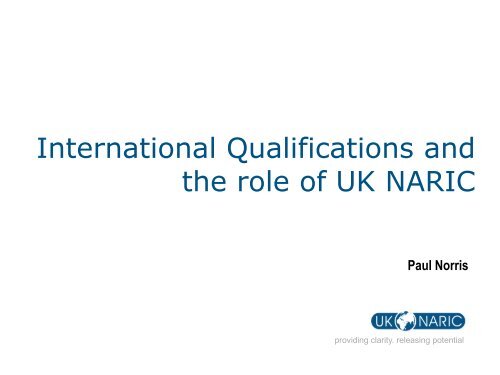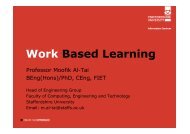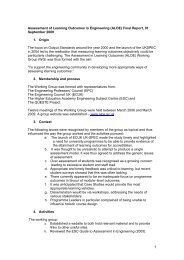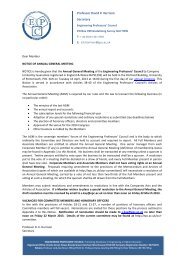International Qualifications and the role of UK NARIC
International Qualifications and the role of UK NARIC
International Qualifications and the role of UK NARIC
You also want an ePaper? Increase the reach of your titles
YUMPU automatically turns print PDFs into web optimized ePapers that Google loves.
The <strong>role</strong> <strong>of</strong> a <strong>NARIC</strong> centre<strong>NARIC</strong> Centres are responsible for <strong>the</strong> recognition <strong>of</strong> diplomas <strong>and</strong>periods <strong>of</strong> study in <strong>the</strong> Member States <strong>of</strong> <strong>the</strong> EU, <strong>the</strong> EEA countries<strong>and</strong> <strong>the</strong> associated countries in Central <strong>and</strong> Eastern Europe <strong>and</strong>CyprusDifferent recognition procedures exist across Europe. Three examplesinclude:• Greece: traditional duration <strong>and</strong> content based assessment process• Ne<strong>the</strong>rl<strong>and</strong>s: complex assessment process, combining credential evaluationpractices with new evaluation models such as accreditation <strong>of</strong> prior learning• Croatia: emerging centre, still developing a methodological approach
The Work <strong>of</strong> <strong>the</strong> <strong>UK</strong> <strong>NARIC</strong>: Clients DataThe <strong>UK</strong> <strong>NARIC</strong>serves over1000 membersin <strong>the</strong> <strong>UK</strong> <strong>and</strong>internationally.Education <strong>and</strong>training sectorcontinues t<strong>of</strong>orm asignificant part<strong>of</strong> <strong>the</strong>membershipbase (2004-05data).
The Work <strong>of</strong> <strong>the</strong> <strong>UK</strong> <strong>NARIC</strong>: SubjectMattersAlthough <strong>the</strong> information dem<strong>and</strong> vary, <strong>the</strong>re has been an identifiable interest in<strong>the</strong> provision <strong>of</strong> education <strong>and</strong> training in key occupations <strong>and</strong> subject areassuch as Health Care, Teaching, Engineering, Construction <strong>and</strong> businessmanagement.
The Work <strong>of</strong> <strong>the</strong> <strong>UK</strong> <strong>NARIC</strong>: Coverage<strong>NARIC</strong> processes on average 50,000 applications per annum for <strong>the</strong> purpose <strong>of</strong>fur<strong>the</strong>r study <strong>and</strong> employment opportunities in <strong>the</strong> <strong>UK</strong>.These applications demonstrate a notable concentration on qualifications fromIndia-Subcontinent, Central <strong>and</strong> Eastern Europe <strong>and</strong> Africa (2006-07 data)U/G & P/G Admissions104739918Pr<strong>of</strong>essionalEmployment13783 Seeking OpportunitiesWork Permits
<strong>UK</strong> <strong>NARIC</strong> MethodologyDeveloping a Code <strong>of</strong> Practice to outline <strong>the</strong> purpose <strong>and</strong> <strong>the</strong> design <strong>of</strong><strong>the</strong> work focusing on:• Evaluation Criteria– Evaluation Criteria need to reflect <strong>the</strong> concerns <strong>of</strong> <strong>the</strong> national system. Theseconcerns centre on whe<strong>the</strong>r internationally trained applicants are:◦ adequately qualified to enter <strong>the</strong> fur<strong>the</strong>r or higher education system in <strong>the</strong> country inquestion.◦ sufficiently well-trained to perform a certain occupational or pr<strong>of</strong>essional <strong>role</strong>– Framework <strong>of</strong> b<strong>and</strong>s <strong>of</strong> attainment centred on◦ Learning outcomes <strong>and</strong> competencies◦ Qualifying measures e.g. credits, exams, assessments etc• Processes <strong>and</strong> Procedures– Transparent <strong>and</strong> fair procedures– Appeals• Service St<strong>and</strong>ards– Self-discipline <strong>and</strong> public monitoring measure
Current Developments <strong>and</strong> <strong>UK</strong> <strong>NARIC</strong>Methodology: The EQFThe European <strong>Qualifications</strong> Framework is an initiative to establish a metaqualifications framework across Europe, linking to national QFs (a priority <strong>of</strong>Copenhagen Declaration)What is a meta framework?• A translation device between different qualification systems <strong>and</strong> <strong>the</strong>ir levels– <strong>Qualifications</strong> do not relate directly to EQF levels– <strong>Qualifications</strong> relate in <strong>the</strong> first place to national structures or systems <strong>of</strong> qualifications (i.e. frameworks)– National structures relate to EQF• EQF is not proposed as a model for NQFsTo achieve this, EQF is envisaged to have:• As few levels as possible• As broad <strong>and</strong> encompassing as possible• Requires generic descriptors
Country ACountry BQualificationQualificationQualificationQualificationEQF Level 8EQF Level 7EQF Level 6EQF Level 5EQF Level 4EQF Level 3EQF Level 2QualificationQualificationQualificationEQF Level 1
Will <strong>the</strong> EQF work well as a ‘metaframework’?At <strong>the</strong> current time, it is envisaged that national authorities will be responsiblefor determining linkages between national QFs <strong>and</strong> EQF. This causesproblems because:1. Many European countries are not familiar <strong>and</strong> do not fully underst<strong>and</strong> <strong>the</strong>concept <strong>of</strong> learning outcomes2. Differences in <strong>the</strong> perception <strong>of</strong> qualifications’ status from one country to<strong>the</strong> next3. Lack <strong>of</strong> a meaningful QA structure4. There is <strong>the</strong> potential for qualification inflation, where countries pitch lowlevel awards at a higher EQF level. Because <strong>the</strong> generic descriptors usedare broad-based, <strong>the</strong>re is room to adapt national wording to fit what is beingrequested.As a contrast, <strong>UK</strong> <strong>NARIC</strong> use 18 b<strong>and</strong>s into which we fit internationalqualifications, because this is <strong>the</strong> level <strong>of</strong> differentiation we feel is requiredto accurate variations in st<strong>and</strong>ard <strong>of</strong> all qualifications.







